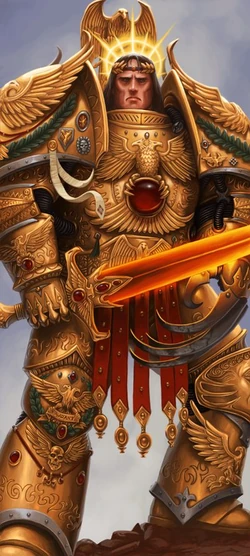
The Emperor of Mankind, the most powerful of the Perpetuals.
A Perpetual was an individual who was a member of a mutant branch of the Human species who possessed seemingly superhuman abilities, the most important of which was immortality, for which they were named.
Some were born with their abilities naturally as a genetic mutation, while others received them through artificial genetic intervention using advanced technology.
However, every Perpetual was known to be effectively immortal, never aging and capable of ultimately healing almost any injury as a result of their extraordinarily rapid and efficient cellular regeneration.
It is this capability that is responsible for their name. Perpetuals have been known to survive dismemberment, suffocation, decapitation and even complete disintegration by directed energy assaults or atmospheric reentry, their bodies always regenerating and even bringing them back to life after clinical death.
Humans can either naturally be born as Perpetuals or be artificially transformed into one through the use of advanced alien technology, such as that used by the xenos alliance known as the Cabal.
The Emperor of Mankind was known to have created several Perpetuals, such as when He transformed the young Administratum Transcriber Dalia Cythera into a Perpetual known as the Guardian of the Dragon during the Great Crusade so that she could watch over the unknown entity called the Dragon of Mars that slept fitfully below the surface of Mars.
But the origin of Human Perpetuals who are born naturally remains unknown, as some, like Alivia Sureka, Erda, and the Emperor Himself, have existed since the earliest ages of Human civilisation on Old Earth.
The only way known to permanently kill a true Perpetual is with the spear-like artefact called the Fulgurite, which was a by-product of the Emperor of Mankind's psychically-produced lightning fusing sand on the world of Traoris, a planet liberated from Chaos Cultists and sorcerers by the Emperor during the Great Crusade in 898.M30.
The resulting mineral retained a portion of the Emperor's power, and was capable of overcoming even a Perpetual's natural regeneration.
History[]
Origins[]
The true origins of the Perpetuals were a mystery even to themselves. The ancient Perpetual Erda, who had been a long-time companion of the Emperor since the earliest days of Human history, considered Perpetuals to have naturally arisen as the next step in Human evolution.
She dubbed them their own new Human species, using the term "Homo superior."
In the early days of Human civilisation on Old Earth, naturally-occurring Perpetuals often took up roles as kings and warlords among the ancient states and tribes, but the greatest and most powerful among them was always the man who would become known as the Emperor millennia later.
The Emperor wished to better Mankind by accelerating the evolution of Homo sapiens into beings similar to Homo superior. He personally sought out every Perpetual who existed on Old Earth in ancient times in the hopes of gaining their assistance for this task.
Some willingly joined Him, while others refused any part of His plans, and some even violently opposed Him. Many of the wars of Human history in the Age of Terra were secretly the result of Perpetual rivals of the Emperor attempting to thwart His plans for Human betterment as He saw it.
One by one the Perpetuals allied to the Emperor eventually left or betrayed Him for reasons of their own, with Erda being one of the last to become disillusioned and leave His side.
At the conclusion of the Unification Wars, the Emperor, with the advice and aid of Malcador the Sigilite, Erda and the geneticist Amar Astarte, director of the Imperial Biotechnical Division, decided to create "Artificial Perpetuals" to guide Humanity through the tumultuous times to come. The subsequent effort to create these beings was named the Primarch Project, and eventually led to the creation of the twenty primarchs of the Space Marine Legions.
Notable Perpetuals[]
- Ollanius Pius (Ollanius Persson)
- Damon Prytanis
- Alivia Sureka
- Semyon
- Dalia Cythera
- Mordrac
- Erda
Sources[]
- Betrayer (Novel) by Aaron Dembski-Bowden
- Know No Fear (Novel) by Dan Abnett, pp. 208-209
- Legion (Novel) by Dan Abnett
- Perpetual (Audio Book) by Dan Abnett
- The Unremembered Empire (Novel) by Dan Abnett
- Vulkan Lives (Novel) by Nick Kyme
- Fabius Bile: Primogenitor (Novel) by Josh Reynolds
- Saturnine (Novel) by Dan Abnett, Part 2, Ch. 3; Epilogue
- Vengeful Spirit by Graham McNeill
- Mechanicum (Novel) by Graham McNeill
- The Ghost Halls (Short Story) by L.J. Goulding
- The Last Council (Short Story) by L.J. Goulding
- Warhammer Community - 500 Facts for 500 Stores!, Fact 206
